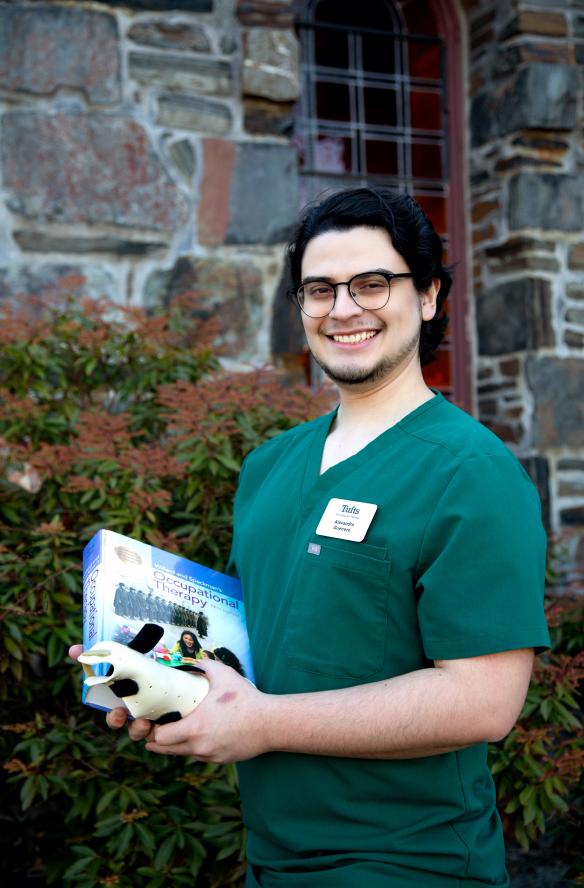A Jack of All Trades

By: Maisie O'Brien
Alexandro “Alex” Guerrero sees occupational therapy and its applications everywhere. “It encompasses everything from daily living tasks to work to hobbies,” Guerrero explains. “Some of my main passions, for example, are playing the flute, video games, and crocheting. If I were to experience an injury, an occupational therapist could help me get back to doing the things that I love.”
As an entry-level occupational therapy doctoral student at Tufts, Guerrero is learning about the many different branches of OT and is most interested in the specialties of physical dysfunction, mental health, and ergonomics. He is also pursuing a certificate in hand and upper extremity rehabilitation. “OT is a great fit for me because I’ve always been a jack of all trades,” he says. “I’m interested in everything and I love learning new things.”
Guerrero was first introduced to occupational therapy by a friend in college and immediately saw its potential impact. “When my friend described what an OT does, I began researching the field. I started realizing that my grandma and uncle could have benefited from occupational therapy if they had known about it,” Guerrero says. “OTs can really help people to get back on their feet after an illness or accident, and live a healthier life overall.
“I grew up in a Latinx culture that didn’t center around healthcare,” he says. “Many members of my community were living in poverty and rarely went to the doctor. We used traditional medicine instead. One of my goals as a future OT practitioner is to bring OT to communities like mine that don’t have access to good quality healthcare.”
Guerrero majored in sociology at UCLA with a minor in global health. After graduation, he worked as a behavioral interventionist for two years, supporting children ages 8-16 living with a variety of diagnoses, including autism and learning disabilities. He helped them enhance their emotional and behavioral regulation as well as their school and life skills. He also volunteered as a summer camp counselor supporting kids living with muscular dystrophy, and at a hospital in Sacramento, shadowing occupational therapists.
At Tufts, Guerrero has valued the collaborative atmosphere, academic resources, and depth of experience of the OT faculty. He has completed fieldwork placements at a community center for older adults and an elementary school. Next year, he will undertake placements at a physical rehabilitation hospital and an in-patient psychiatric facility.
Guerrero was surprised by how many research opportunities there are within the Tufts OT Department as well as how much he has enjoyed participating in them. “I never thought of OTs as researchers until I took a class in clinical research,” he says. “My advisor, Nancy Baker, always emphasizes the importance of contributing to evidence-based research because a specific treatment may be effective, but if it’s not backed up by research, then that is a problem for the field.”
This summer, Guerrero is spearheading a research project testing whether an immersive virtual reality intervention can help reduce chronic pain in clients living with complex regional pain syndrome (CRPS). “This study is particularly important because there are very limited non-pharmacological treatments to help patients with CRPS manage their pain symptoms and common treatments have a fairly low efficacy rate,” he explains. “I’m currently in the process of getting approval for the project from an Institutional Review Board. It’s exciting learning how to implement a research study from beginning to end.”
While Guerrero is uncertain of which branch of OT he will specialize in, he is excited to begin working in the field, contributing to evidence-based research, and advancing occupational justice.